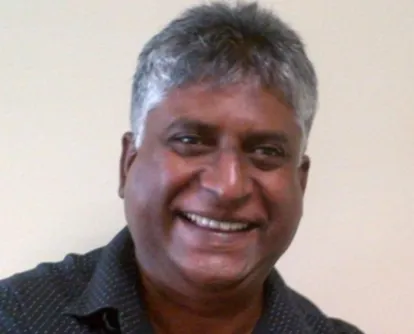Embracing oneness: a call for inclusive dialogue
Towards a united South Africa

To build South Africa into a prosperous and inclusive nation, strategic partnerships and collaboration across various sectors are imperative, says the writer.
Image: Diva Plavalaguna//Pexels.com
The National Dialogue, announced by President Cyril Ramaphosa, will start with a National Convention on August 15 in Johannesburg, followed by a second national convention in 2026. The dialogue will be a people-led, society-wide process, aimed to reflect on the state of the country to shape the next chapter of South Africa's democracy. Siva Naidoo says embracing the concept of oneness is what is needed to combat corruption, tribalism, and inequality, which will ultimately steer the country towards a prosperous and inclusive future.
I BELIEVE it is imperative to foster robust national dialogue to ensure unity and communal harmony. Guided by this belief, I encourage a dialogue that transcends racial and ethnic barriers, promoting the unification of all citizens under the banner of shared humanity and patriotism.
The concept of oneness:
The concept of oneness holds that all beings are part of a single universal family. This principle emphasises the intrinsic connection between individuals and the collective consciousness that binds humanity. In the South African context, this ideology promotes the vision that we are one people, one nation - irrespective of our diverse backgrounds. By embracing this spiritual and humanistic perspective, we can lay the groundwork for an inclusive dialogue that fosters mutual respect and understanding.
Giving life to the Constitution and the Freedom Charter
The South African Constitution, inspired by the celebrated Freedom Charter, enshrines the principle that all national groups shall enjoy equal rights. To honour this foundational document, it is essential that we - collectively as a nation - bring its ideals to life. This means working in concert to create a South Africa where resources are shared equitably, and all citizens, particularly the poor and vulnerable, benefit from our national wealth.
Collaborative efforts for a winning nation
To build South Africa into a prosperous and inclusive nation, strategic partnerships and collaboration across various sectors are imperative. This involves dismantling the remnants of discriminatory practices, including selective affirmative action, and fostering an environment where creativity and proactive nation-building efforts can thrive. The fleeting sense of unity experienced during the Soccer World Cup and subsequent Rugby World Cup victories can become a permanent feature of our national consciousness if we actively work towards it.
Addressing the concerns of marginalised minorities
Minority communities in South Africa, including the Indian community, often feel marginalised and disconnected from the broader national identity. This disconnection manifests in stronger allegiances to ancestral homelands than to South Africa itself. To remedy this, the promotion of unity and the oneness of humanity must take centre stage in national dialogue. By emphasising our commonalities and shared goals, we can nurture a more inclusive national identity.
Commitment to clean government and ethical leadership
A paramount aspect of national dialogue should be the insistence on clean government and ethical leadership at all levels. The credibility of our nation depends on the transparency and integrity of its governance. This includes prioritising a work ethic within the public service to ensure improved service delivery and fostering a political culture where the interests of the country take precedence over party interests.
Fighting corruption, cronyism, and nepotism
The pervasive issues of corruption, cronyism, and nepotism must be addressed with unwavering determination. The strength and credibility of our nation are undermined by such practices. Therefore, robust measures to weed out corruption and reinforce good corporate governance are essential for maintaining public trust and fostering an environment of fairness and justice.
Investing in the youth: the flowers of our nation
Our youth represent the future of South Africa, and their minds must be nourished with values-based education from an early age. By instilling in them the principles of integrity, respect, and responsibility, we can cultivate a generation of ethical leaders and responsible citizens. Education in human values is non-negotiable if we are to build a cohesive society.
Confronting tribalism, racism, and corruption in minority communities and beyond
South Africa's history is indelibly marked by the scars of tribalism and racism, phenomena that have sown deep-seated divisions within our society. While the transition to democracy was a monumental achievement, the remnants of past injustices continue to influence contemporary issues. In this context, I urge minority communities, as well as African tribes, to critically assess and confront their roles in perpetuating tribalism and racism.
Addressing reactionary roles in tribalism and racism
The legacy of apartheid has left a lasting imprint on societal attitudes and inter-group relations in South Africa. Tribalism and racism are pervasive issues that continue to affect community dynamics. It is essential for all groups, including minority communities and African tribes, to engage in introspective evaluation of their roles in perpetuating these divisive ideologies.
Pointing fingers or vilifying any group only serves to exacerbate the problem rather than resolving it. The tendency to revert to tribal or racial identities in times of social stress undermines national solidarity. It is crucial to recognise that such reactionary roles are not inherent but are often the result of historical conditioning and socio-economic pressures. By acknowledging the complex roots of these behaviours, communities can work towards unlearning divisive tendencies and fostering inclusive attitudes.
The role of media in exposing corruption
The media wields significant power in shaping public perception and discourse. As such, it has a critical role to play in exposing corrupt practices across all sectors. The findings of the Zondo Commission of Inquiry have highlighted the need for comprehensive media coverage of corporate tender fraud and other malpractices.
There is a tendency for media reports to disproportionately focus on the role of government and black tenderpreneurs in corrupt activities. While these reports are important, a more balanced approach is necessary. Equal scrutiny should be applied to corporate entities and other sectors involved in tender fraud and corruption. Only by doing so can we ensure an unbiased and thorough examination of corruption in South Africa.
Transforming the conservative elements within the Indian community
We need to face our own challenges in confronting issues of race and class within our community. Many members hold conservative right-wing views that may not fully align with the broader goals of unity and inclusion. It is incumbent upon us to engage in a transformative process that encourages us to reflect on the broader socio-political issues affecting South Africa.
We must advocate for a more inclusive outlook within its community. This involves promoting awareness of the interconnected nature of race, class, and economic disparities. Encouraging dialogue and critical reflection will help shift perspectives towards a more holistic understanding of the challenges facing the nation.
Conclusion
The journey towards a more unified and equitable South Africa requires the active participation of all communities. Minority groups and African tribes must confront their own roles in perpetuating tribalism and racism, recognising that these issues are deeply rooted but not insurmountable.
Corruption continues to be a pervasive problem that affects everyone, and holding corrupt government and business leaders accountable is essential. So too, we must hold citizens accountable for its divisive role inherent on social media which continues to threaten a capable development state built on the foundation of oneness.
Through these concerted efforts, we can move closer to realising the vision of a united, just, and prosperous South Africa. The national dialogue could very well be the catalyst towards building a vibrant South Africa rooted in oneness oneness and ubuntu.
As a community we must play a critical role in advancing a progressive dialogue on the constitutional rights and responsibilities of all communities, including minority communities. Equally we must generate loyalty and patriotism to our Constitution as opposed to racial class or caste identities.

Siva Naidoo
Image: Supplied
Siva Naidoo is an activist, and Ubuntu and human values trainer: [email protected]
** The views expressed do not necessarily reflect the views of IOL or Independent Media.